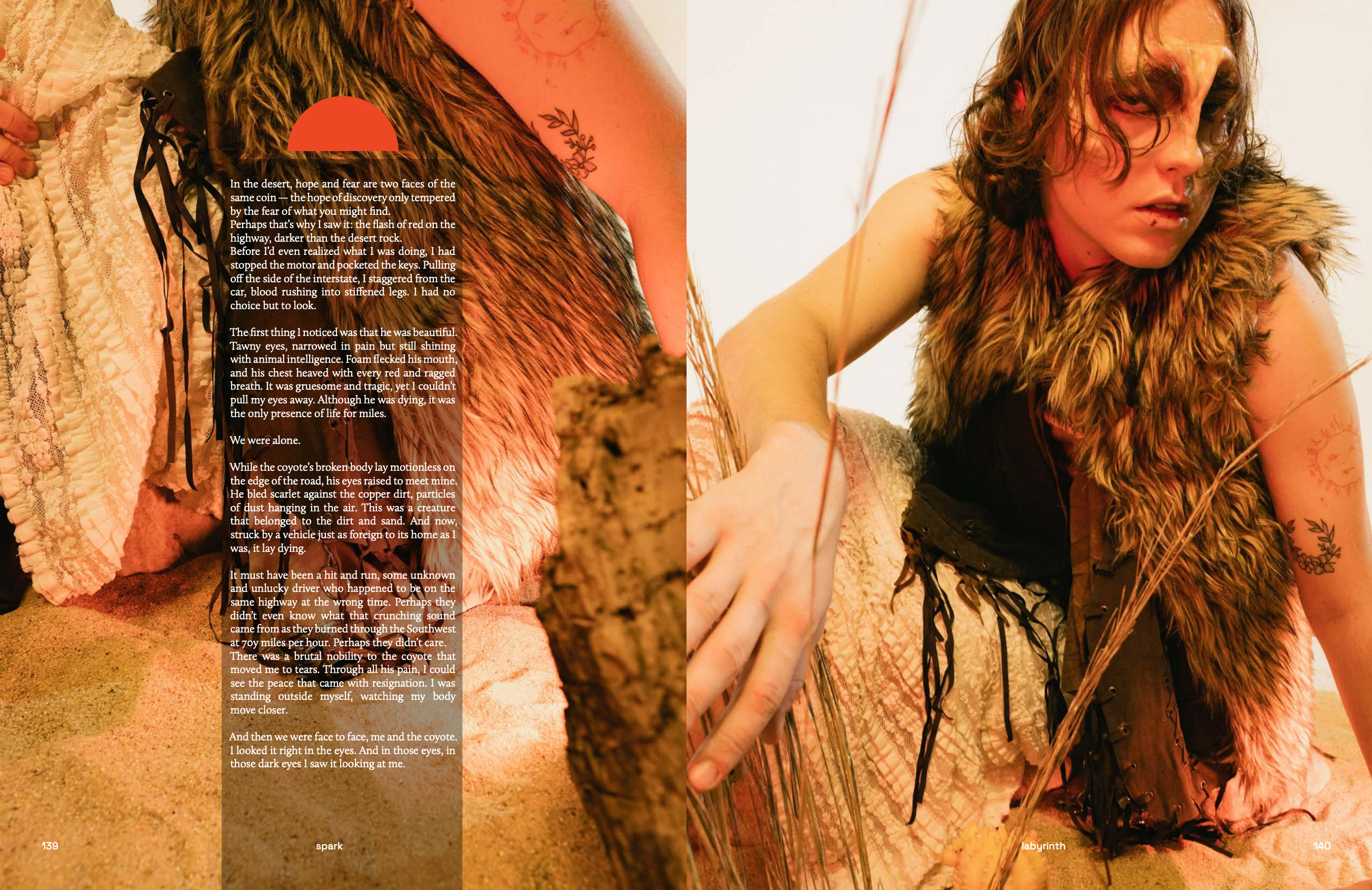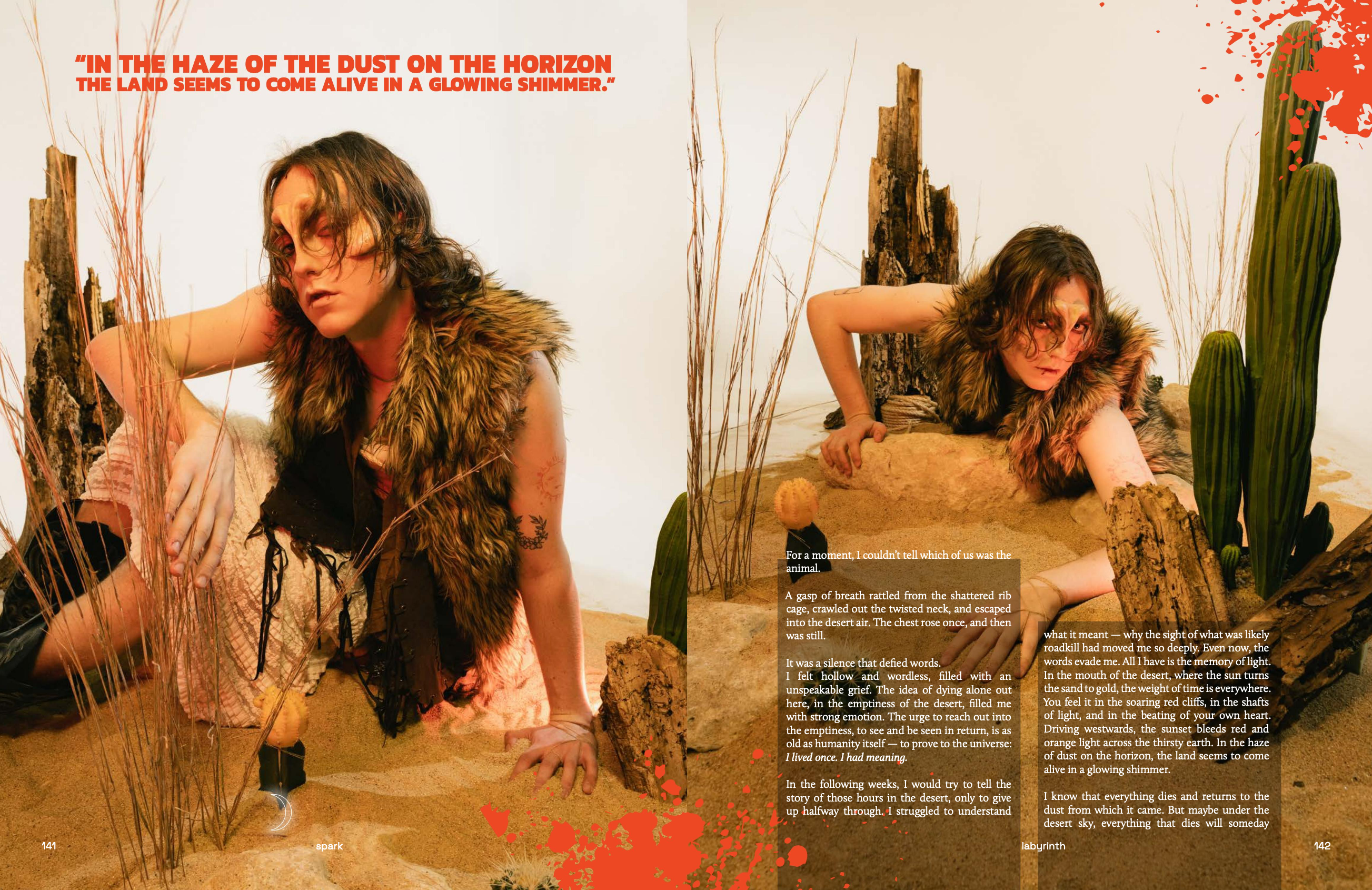The Mouth of the Desert
By Samuel Weiss
May 2, 2023

Into the desert I ran, and under the open sky I was changed.
I first fell in love with the desert when I was just a child. I was born under an endless Texas sky — a deep and cloudless blue that stretched beyond comprehension, bleeding into the dust-choked horizon. There’s no sky quite like it, so big I feared it could crush me. Standing under that heavy emptiness, there was a sense of self-recognition in the longing mirrored beneath. The miles of cracked earth were desolate save for the memory of rain.
In one of his rare moments of intimacy, my father took our family to the Sedona energy vortex. High above the Arizona desert, pillars of swirled rock point towards the heavens, polished smooth by millenia of wind and sand. Locals believe that cosmic energy emanates from the red cliffs, spiraling into the sky in New Age energy-healing fashion. As we stood on the mountain watching the stars rise, my father put his arms around me and asked if I could feel the energy.
“This is a sacred space,” he told me. I believed him, but I wasn’t looking up at the sky. My eyes were fixed on the twilight-blue land stretching below us. My heart was filled with an unspeakable loneliness echoing from the red rocks.
Sometimes, when I’m on the edge of sleep, I see that landscape purpling against my eyelids. Something about the desolation of the desert compelled me. From the emptiness, it gained the power of possibility — from nothingness, anything can emerge. It was a place of total freedom — an inhospitable wasteland stripped of everything but dreams. In a place where only they can live, dreams accumulate and slumber. The barren earth turns fertile with their presence. It is the home of revelation: a destination for prophets and hermits to go in search of God.
When I drove alone into the desert I was 19 and full of anger. I felt young and self-destructive; the hot air scorched my lungs and filled my head with fire. Squinting against the sun, it was a self-imposed exile of sorts — a pilgrimage without a destination. Within the first few hours, red dirt towns and God-fearing billboards gave way to flat rock and dust clouds. Through it all, the highway snaked, tracing veins and arteries across the heart of the Southwest.
My memories are defined by absences. No people, no houses. Every rock was burnt by the sun and swept by the wind until the whole landscape was majestic in its desolation — no trees, no clouds. Even the birds had abandoned these skies; the sound of their wings was replaced by an interstate highway map fluttering on the seat beside me.
After a few hundred miles, the sky and the road started to blur together. As dust danced in the heat waves rising from the red earth, the horizon shimmered, porous. I loosened my grip on the wheel to let the car sway in lazy curves across the road, rocking like a boat upon an asphalt sea. I’ve always thought of driving as a meditative activity, with the repetition of the roads and hum of the motor transforming into a mantra. It’s the hypnotism of motion, the mind wandering as the body continuously travels forward.
There’s something special about this land. It swallows you whole and spits you out, changed. Under the sun, every pretense I held slowly melted away. I left my anger abandoned miles behind me. Surrounded by the age of the landscape, a timeless quiet entered me. I had been emptied out, purified, and I was ready for revelation.

In the desert, hope and fear are two faces of the same coin — the hope of discovery only tempered by the fear of what you might find.
Perhaps that’s why I saw it: the flash of red on the highway, darker than the desert rock.
Before I’d even realized what I was doing, I had stopped the motor and pocketed the keys. Pulling off the side of the interstate, I staggered from the car, blood rushing into stiffened legs. I had no choice but to look.
The first thing I noticed was that he was beautiful. Tawny eyes, narrowed in pain but still shining with animal intelligence. Foam flecked his mouth, and his chest heaved with every red and ragged breath. It was gruesome and tragic, yet I couldn’t pull my eyes away. Although he was dying, it was the only presence of life for miles.
We were alone.
While the coyote’s broken body lay motionless on the edge of the road, his eyes raised to meet mine. He bled scarlet against the copper dirt, particles of dust hanging in the air. This was a creature that belonged to the dirt and sand. And now, struck by a vehicle just as foreign to its home as I was, it lay dying.

It must have been a hit and run, some unknown and unlucky driver who happened to be on the same highway at the wrong time. Perhaps they didn’t even know what that crunching sound came from as they burned through the Southwest at 70 miles per hour. Perhaps they didn’t care.
There was a brutal nobility to the coyote that moved me to tears. Through all his pain, I could see the peace that came with resignation. I was standing outside myself, watching my body move closer.
And then we were face to face, me and the coyote. I looked it right in the eyes. And in those eyes, in those dark eyes I saw it looking at me.
For a moment, I couldn’t tell which of us was the animal.
A gasp of breath rattled from the shattered rib cage, crawled out the twisted neck, and escaped into the desert air. The chest rose once, and then was still.
It was a silence that defied words.
I felt hollow and wordless, filled with an unspeakable grief. The idea of dying alone out here, in the emptiness of the desert, filled me with strong emotion. The urge to reach out into the emptiness, to see and be seen in return, is as old as humanity itself — to prove to the universe: I lived once. I had meaning.
In the following weeks, I would try to tell the story of those hours in the desert, only to give up halfway through. I struggled to understand what it meant — why the sight of what was likely roadkill had moved me so deeply. Even now, the words evade me. All I have is the memory of light.

In the mouth of the desert, where the sun turns the sand to gold, the weight of time is everywhere. You feel it in the soaring red cliffs, in the shafts of light, and in the beating of your own heart. Driving westwards, the sunset bleeds red and orange light across the thirsty earth. In the haze of dust on the horizon, the land seems to come alive in a glowing shimmer.
I know that everything dies and returns to the dust from which it came. But maybe under the desert sky, everything that dies will someday come back. ■
Layout: Mateo Ontiveros
Photographer: Mateo Ontiveros
Stylists: Adeline Hale & Alexandra Howard
Set Stylist: Mateo Ontiveros
HMUA: Reagan Richard
Model: Aaron Boehmer
Other Stories in Labyrinth
© 2025 SPARK. All Rights Reserved.
